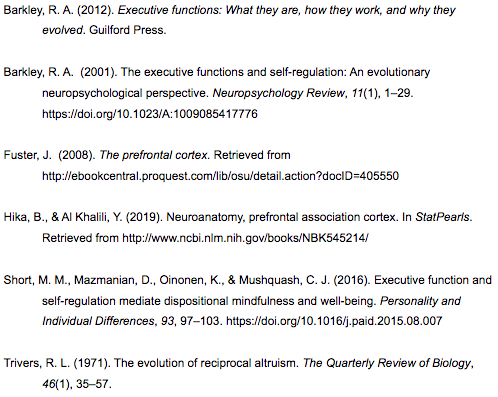How can an increased understanding of my executive function lead to a better sense of my own well-being?
Well, first off, this is a pretty loaded question! This is mostly because executive function is more of an abstract concept than it is an absolute concrete entity. One leading researcher on executive function describes it to be “the use of self-directed actions so as to choose goals and to select, enact, and sustain actions across time toward those goals usually in the context of others often relying on social and cultural means for the maximization of one’s long-term welfare as the person defines that to be,” (Barkley, 2012).
To put this into hopefully clearer terms, executive function corresponds to regions of the brain that make decisions and inhibit other thoughts or impulses in the pursuit of long term goals. This can include managing emotions, executing plans, and filtering out irrelevant distractions, among several other functions (Fuster, 2008). All of these functions are thought to take place in a region of the brain called the prefrontal cortex, which is basically the region of the forehead. Outside of disorder or disease, humans have highly developed prefrontal cortexes compared to other animals, which essentially correlates to our superb ability to suppress personally or socially undesirable thoughts (Hika & Khalili, 2019).
Basically, you more likely than not have a strong ability to suppress undesirable thoughts in favor of more desirable ones! This can be in regard to your self-esteem, your perception of others, your thoughts of your current environment, and several other perceptions!
There are some speculative thoughts as to why humans developed an elaborate executive function from an evolutionary perspective. Among these are to facilitate observational learning, social self-defense mechanisms, and enforce altruistic principles beneficial to the human species as a whole (Barkley, 2001). In the case of altruism specifically, social adaptations such as friendship, gratitude, sympathy, and trust can be thought of as important in the development of a strong executive function evolutionarily in humans (among other undesirable traits such as dislike, guilt, and moralistic aggression) (Trivers, 1971). In short, these positive emotions that we enjoy experiencing in our own lives could have a strong evolutionary basis and could be dependent on the development of our executive function abilities in our prefrontal cortex.
Finally, here are the really great implications of all this scientific research. Like I previously mentioned, outside of disorder and disease, we all have the ability to use our executive function to filter out distressing and distracting thoughts in favor of more pleasant and optimistic thoughts. It is more a matter of learning how to do so, which is what many psychologists are trained to do in order to help their patients cope through very stressful life situations. Cognitive behavior therapy is one especially popular approach to help patients challenge distressing thoughts and guide them in the direction of replacing those thoughts with more pleasant interpretations. Many conditions such ADHD and OCD are correlated to abnormalities and lesions in the neuronal pathway of the prefrontal cortex and other parts of the brain, which further demonstrates the importance of this region in executive function. In the words of another scientific article, “executive function and self-regulatory abilities help explain why dispositional mindfulness is protective against future experiences of psychological distress and promotes well-being,” (Short, Mazmanian, Oinonen, & Mushquash, 2015). Therefore, to conclude, the ability to take control of your own thoughts for the better is more likely than not within your own control outside of extreme cases. So try your best to be mindful of these findings. They suggest you really can filter out those ruminative thoughts if you can find more pleasant ones to replace them with!
Thank you all so much for reading. This topic took a lot of research on my end, which is why I was not able to post for a while. Thank you for your patience as I looked into this topic quite deeply, and I look forward to any contributions you have to the content or hearing any thoughts you may have. As always, I hope you all are doing well!
References:

I agree with you and these researchers of our ability, outside of ‘extreme cases’ to think positive. It’s within our power to change our outcome, our attitude. Change our mind set to the hope that whatever is happening that’s causing us to feel negative emotions and pain will not last forever, unless we let it happen. We are in-charge of our lives, our issues and struggles as adults, to think on happier times, rise above and not so much pigeon-hold ourselves in being stuck in the agony of the pain. It’s not always easy, but not doing anything is worst. Finding the cause and refocusing our energy is the doorway to the acceptance of changing within. In thinking differently from our current situation clears our mind to figure-out a better solution, a better way to handle life’s crises. Even if the outcome is sometimes having the patience to ride it out. Nothing last forever unless we stay in this negative way of thinking.
Hope, believing all will be well in the long run helps our psyche, and our consciousness is in a better place. I also believe having faith in God is our key in keeping ourselves above the disarrays life sometimes gives/throws at us. Be filled with joyful trust and careful not to be carried away by the errors. Again it’s not always easy to rise above but worth the effort.
Thank you for the positive message, God bless.
LikeLike
We where made in the image of God simple but complicated. The brain i know very little about, is the most interesting organ we have.
LikeLiked by 1 person
I couldn’t agree more, the brain is one of the most fascinating yet difficult organs to understand. Still, I do think that it is ultimately in the image of God, how so is a bit more unclear. Thank you for your comment!
LikeLike